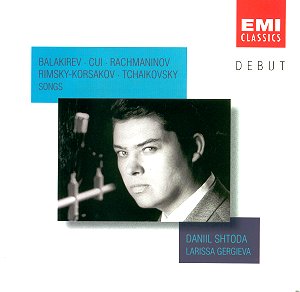Piotr Il'yich TCHAIKOVSKY
Serenade, op.63/6, The Nightingale, op.60/4, At the Ball, op.38/3, Again,
as before, alone, op.73/6, Night, op.73/2 (see comment in review); I should
like in a single word; It was in the early spring, op.38/2, Why? Op.6/5,
Does the day reign? Op.47/6
Mily BALAKIREV
Embrace, Kiss; Spanish Song
Nicolai RIMSKY-KORSAKOV
The Octave, op.45/3, The clouds begin to scatter, op.42/3, The rose and
the nightingale, op.2/2, Oh what in the silence of the night, op.40/3, The
Nymph, op.56/1
César CUI
The burnt letter, op. 33/4, A statue in Tsarskoe, op.57/17, I loved you,
op.33/3
Sergei RACHMANINOV
Do you remember the evening? Lilacs, op.21/5, They answered, op.21/4, At
my window, op.26/10, Oh do not sing to me, op.4/4, Fragment from A. de Musset,
op.21/6
 Daniil Shtoda (tenor), Larissa
Gergieva (pianoforte)
Daniil Shtoda (tenor), Larissa
Gergieva (pianoforte)
 EMI CLASSICS DEBUT CDZ
5 74232 2 [64.29]
EMI CLASSICS DEBUT CDZ
5 74232 2 [64.29]
Crotchet
AmazonUK
AmazonUS

We are informed that the EMI Classics "Début" series focuses "on artists
on the brink of major international careers, allowing them to take full advantage
of the standards of expertise set by Abbey Road Studios". Before EMI give
themselves any further pats on the back as public benefactors, can I point
out that they are not really helping a young artist all that much by presenting
him in a recital of songs in a language which not many people outside Russia
know, without printing either texts or translations or even a summary of
each individual song (we get a brief note from the singer and a general
introduction - good as far as it goes - to Russian song). Translations cost
money, I know (and a bigger booklet would have resulted), but EMI must have
accumulated translations to most of the songs over the years (they have not
always been so penny-pinching over this matter). And in any case, translators
are not very highly paid and fresh translations of the lot would not have
broken their bank. The result is that those who, setting aside the début
aspect, would have liked an introduction to Russian song and might conceivably
have been directed towards this disc, will have to be recommended elsewhere.
Which is a pity.
Here we have a well-produced light tenor voice, very even throughout its
range and with an attractive, not excessive, vibrato. His curriculum mentions
Ottavio (in Don Giovanni) as among his roles, and that should give
you an idea of the type of voice. Basically the songs are well-chosen to
demonstrate his best points. Those few which require him to bring more pressure
to bear on the voice, notably Tchaikovsky's op.73/6, find him forcing the
tone, with the vibrato becoming not quite a bleat but not far off it. Top
Bs and Cs (of which there is just one, in Balakirev's Spanish Song)
are heavy and strenuous. They are steady and in tune, but unpleasant to the
ear and he would have done better to sing those (very) few songs in a lower
key.
Gergieva (Mrs. Valéry Gergiev) accompanies attentively and it says
much for the music and for Shtoda's natural sense of line that, even without
having any more idea as to what they are about than can be gleaned from the
titles, a lot of these songs emerged as extremely attractive. I should very
much like to know more about Rimsky-Korsakov's The Clouds begin to
Scatter and Cui's A Statue in Tsarskoe. The Rachmaninov group
is also highly effective.
For most of the Tchaikovsky and two of the Rachmaninov I was able to find
scores, and I have to report some rather odd things. First of all, whatever
track 5 is, it isn't Night so I hope the songs I couldn't check up
on are what they are claimed to be. More diffidently, I point out that in
It was in the early spring the changes of tempo don't correspond to
those in the score. Diffidently, because my old Boosey edition might have
been doctored to fit an English text. Less diffidently, I have to say that
Oh, do not sing to me is extraordinarily slow for an allegretto
and when Rachmaninov writes meno mosso they actually go faster!
I took the score to the piano and remain convinced that Rachmaninov meant
what he said. Also, I don't see why they need to go so slowly on the third
page of the Fragment from A. Musset where Rachmaninov has specifically
indicated Tempo I. However, if this suggests an overall do-it-yourself
approach, the other Tchaikovsky songs to which I had scores were interpreted
pretty faithfully so these anomalies are not necessarily widespread.
As a visiting card for a promising singer (though I hope he will keep to
repertoire which does not push him beyond his means) this disc serves its
purpose. As a recital of Russian song di per se it could have been
recommended, but under the circumstances can only be so to those who know
Russian. I urge EMI to conduct an urgent review of their policies over the
matter of texts.
Christopher Howell

